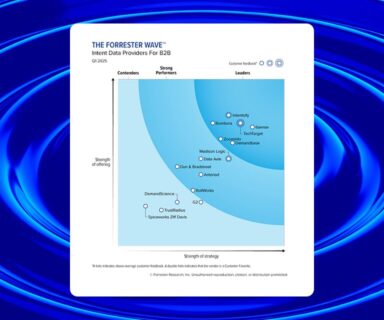Account-based marketing (ABM) has become a fundamental strategy for many tech organizations to engage target accounts more effectively and drive more revenue overall. Now, as ABM teams have settled into foundational ABM tactics, rapid technological and market changes are shifting the focus from maintaining the current strategy to “How can we use ABM in the future?”
Gemma Davies, Head of Global ABM at ServiceNow and a 20-year ABM veteran for multiple Fortune 500 companies, is working to answer this question. In a recent webinar, we spoke to Gemma about her predictions for the future of ABM and how we can best prepare.
Prediction #1: ABM strategies will center on account-based experiences that build genuine connections.
According to TechTarget research, 65% of tech professionals say that continuing to solve their problems and understand their needs is the best way for vendors to retain them as a customer. Gemma predicts that for ABM, the focus on customer priorities will become even greater. “Marketing strategies should focus on how we build those genuine connections with customers” says Gemma. To reach buyers in the future, ABM teams need to prioritize authenticity and transparency in their messaging, which can be achieved through validating solutions, showcasing company values and highlighting social responsibility. This approach not only differentiates a business but also becomes the foundation for establishing deeper relationships.
To build genuine connections with target accounts, GTM teams should focus on relevance, rather than just personalization, because it improves the likelihood a prospective buyer will become a customer. 91% of tech buyers are more likely to buy from a brand that provides them with relevant content. “Personalization is great, but relevance is way more important. And our ability to leverage the data, analytics and AI to tailor content and messages to those individual preferences and behaviors at scale will be an absolute game changer,” says Gemma.
As teams tap into authenticity, transparency and relevance to build connections, they also need to think about using this approach for every message with an account. “ABM is relevant to the whole customer lifecycle. So, we need to ensure we’re delivering these exceptional experiences at every touch point to really help create those long-term advocates.”
Prediction #2: GenAI will help ABM practitioners leverage data and insights to better tailor content to buyers’ preferences and behaviors.
The integration of generative AI (GenAI) into ABM strategies gives marketers the ability to analyze real-time data to optimize campaigns more quickly, and potentially put buyers in the hands of sales teams faster. However, GenAI adoption requires experimentation and risk-taking amongst marketing teams to achieve success. Buyers have yet to fully adopt GenAI, with 90% of buyers prioritizing content from trusted experts over GenAI. From Gemma’s perspective, harnessing the great power of GenAI begins with ABM leaders: “… as leaders, our most important job is to build the AI culture. I think as with all things culturally, it’s difficult to define exactly. But how do we instill a healthy curiosity in our teams to explore new innovations and learn from them and continuously feel brave enough to try things and encourage others?”
Part of that shift can be made by thinking of GenAI as an opportunity rather than a risk or danger. “It’s about shifting the culture to thinking: ‘How do we learn to work with AI as if they were a coworker rather than fearing that it could take or replace our jobs?’” Gemma suggests. To achieve this, Gemma balances GenAI content with human insights, which ensures that the customer experiences remain personal and engaging.
Prediction #3: The next era of ABM will require better alignment and synergy across the entire organization, not just marketing.
While ABM typically falls within Marketing’s remit, aligning the goals of the entire business helps ABM make the right impact, more quickly. To evaluate and evolve their ABM strategy, Gemma and the entire ServiceNow team have a collaborative culture of learning and experimentation. At ServiceNow, Gemma says “ABM is a great channel for different teams to be able to attribute actual business impact and pipeline.” For example, to boost ABM-focused content, Gemma meets with her editorial team to align their content strategy to topics target accounts are reacting to in real-time, and then sharing that content with target accounts ahead of wider audiences. This approach helps the ABM and editorial teams both achieve their objectives through a collaborative process. It’s a win-win, with a foundation of using ABM as a point of growth for the entire business.
“ABM is not a team,” says Gemma. “It’s a way we orchestrate the great work of Marketing across the board.” Here are some other ways Gemma is building an ABM-centric approach across GTM teams:
- Enable Sales and Marketing to help each other: Gemma has seen many sales leaders become great contributors to ABM and marketing strategy, and vice versa. To enable this, she has conversations with Sales to review ABM performance and collect feedback to adjust strategies accordingly. “Continuing to advocate and build on that is really important,” says Gemma.
- Balance short-term and long-term goals: While the goal of ABM is to drive more revenue from a set of accounts, revenue-specific objectives can take time. Gemma recommends balancing short-term KPIs and long-term goals. Short-term KPIs, such as engagement rates, contact engagement and email conversion rates can help CMOs understand value and show the importance of early impact. And when combined with long-term goals such as account penetration and pipeline acceleration, ABM teams can build a narrative that articulates the full impact of their program on the business.
- Develop skills and capabilities to avoid burnout: ABMers are often integrated into large complex accounts and work at a fast pace. They take a lot on their shoulders, which can lead to burnout. As an ABM leader, Gemma has found it’s useful to take a proactive approach with her team members: “I think part of [reducing burnout] comes from training and developing skills that go beyond the core marketing competencies – thinking about their presentation skills, their own personal development.” Experimenting with new AI technologies with her team also can help eliminate the rote administrative tasks so ABMers have more time to focus on the deep thinking required to be successful.
The customer should always be the heart of ABM
While ABM teams must always evolve to keep up with broader industry changes, they should continue to focus on the preferences and needs of their buyers as their North Star. By building relevant customer experiences, leveraging emerging technologies and aligning across the entire organization, you can reap the benefits of a customer-first approach and stay ahead of the curve.
As Gemma notes, “No one can ever say you’re doing anything wrong if you can justify that it’s in service of driving an outcome for the customer.”
For more insights into Gemma’s ABM philosophy, watch ABM Predictions: Planning for the Future with Gemma Davies.




